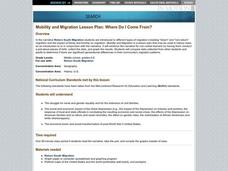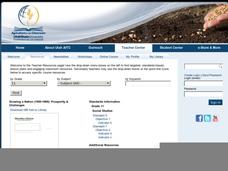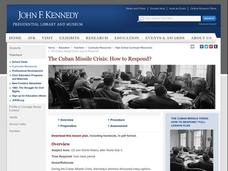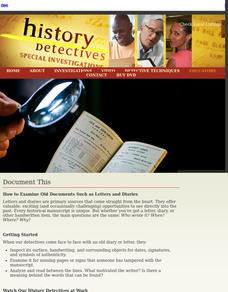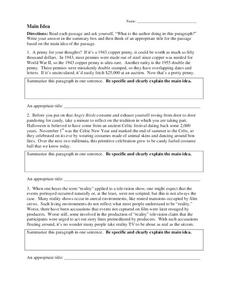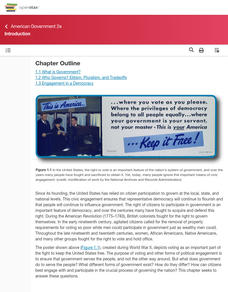Curated OER
WHERE DO I COME FROM?
Students analyze the struggle for racial and gender equality and for the extension of civil liberties, the social and economic impact of the Great Depression, and the economic boom and social transformation of post-World War II United...
Curated OER
History of Hong Kong
Eighth graders explore the sites and attractions of Hong Kong. In this Geography instructional activity, 8th graders research the different forms of transportation and major landmarks. Students create a travel brochure for Hong Kong.
Agriculture in the Classroom
Growing a Nation (1950-1969): Prosperity & Challenges: The Story of American Agriculture
A wonderful lesson on the development and impact of mechanized farming! History or agriculture classes learn the historical background of the United States' food production by creating a pamphlet with information on the cause and effect...
Museum of Tolerance
Documents That Shape Society
The Bill of Rights is a foundational document of American democracy, much like the Nuremberg Laws were a foundational document of the Reichstag of Nazi Germany. But that's where their similarities end. Engage high schoolers in a...
Central Oregon Community College
Things Fall Apart Study Guide
“There is no story that is not true.” And Chinua Achebe’s Things Fall Apart, uses proverbs (“. . .the palm-oil with which words are eaten”), a compelling tragic hero, and historic events, to engage readers in the truth of his story of...
John F. Kennedy Presidential Library & Museum
The Cuban Missile Crisis: How to Respond?
For 13 days, the United States stood on the edge of nuclear War. The Soviet Arms buildup in Cuba is the focus of an activity that asks groups to analyze how the governmental role each of John F. Kennedy's advisors played went on to...
Curated OER
Nous Nous Souvenons: French-Canadians
Students research the French-Canadian influence in northern New York. They interview families of French-Canadian descent, research immigration history, visit a French restaurant, write narratives about their experiences interviewing...
Constitutional Rights Foundation
Driver’s Licenses And Unauthorized Immigrants
Should driver's licenses be granted to unauthorized immigrants? That is the question class members grapple with in a lesson that asks them to first read a fact sheet that details the arguments for and against licensing unauthorized...
Curated OER
Reading in Context: The Diary of Anne Frank
Step into the hopeful and tragic world of Anne Frank with this activity on reading in context. After complete a variety of activities related to the first two scenes of The Diary of Anne Frank, eighth graders participate in a read aloud...
PBS
Document This
Being a historian requires serious sleuthing. They examine primary source documents and look for evidence, for clues that reveal who wrote the document, when, and why. After watching two historians model the process, young history...
Curated OER
The Great Depression and New Deal
Elementary pupils are introduced to the Great Depression as a critical period of hardship in United States history. They engage in collaborative assignments researching the Dust Bowl, the New Deal, US presidents, and presidential libraries.
Historica-Dominion Institute
Artifact Creation Activity
Creating an artifact that is representative of a specific time period provides an opportunity for amateur historians to understand the importance of primary sources. This resource describes the process for students to explore original or...
National Energy Education Development Project
Exploring Oil and Gas
The United States consumes more oil than any other country, about 1.85 billion barrels (or 77 billion gallons) a day. Viewers learn about the history of fossil fuel exploration and how they are formed in an informative presentation. They...
E Reading Worksheets
Main Idea
To develop their reading comprehension skills, learners read short paragraphs, summarize the passage in one sentence, and then develop an appropriate title that indicates the main idea of the selection.
Rice University
American Government 2e
An informative resource provides a textbook on American government that covers topics such as the definition of government and how democracy works. Each section provides brief questions at the end to assess scholars' understanding.
Curated OER
History Trivia For Kids
There are 40 history trivia questions and answers. Students have to cut out the questions and the answers and try to match the correct answer to the question. The trivia questions are all related to history but from many different...
Curated OER
the International Criminal Court's History And Uses
Learners analyze and come to explain the history behind the formation of the International Criminal Court, along with the recent controversy facing the Court; and current crises that warrant the Court's attention.
Curated OER
Internment of Japanese Americans
Students study the Japanese-American experience in the western United States during World War II. They view a video, "Japanese Relocation" and take notes on arguments in favor of internment. They share their notes and new vocabulary...
Curated OER
Voices of Hope and Seeds of Peace
Students read reflective essays to gain an understanding of the experiences of young people growing up in an area at war. Students locate groups who bring together opposing sides in a conflict for purposes of reconciliation.
Curated OER
This is Not a Drill
Students examine the events of Pearl Harbor through photographs, timelines and primary source documents. They research many different sources and discover the need to have more than one point of view. They write a newspaper article...
Curated OER
Checks and Balances: Japanese-American Incarceration
Middle schoolers examine the three branches of the Federal Government and their decision to place Japanese-Americans in camps during World War II. They analyze debates made by leaders during this time period.
Curated OER
Scapegoating
Students examine how stereotypes, prejudices and discriminatory practices lead to individuals and groups being blamed for events. They are introduced to the internment of Japanese Americans during World War II.
Curated OER
WWII Newspaper Using the Team Interview Model
Learners interact with each other to conduct interviews after conducting meaningful research about the era of World War II. The interview is conducted in a group and then can be presented to another group or the whole class.
Curated OER
The Ethics of the Bomb: What Would You Do?
Learners research the use of the atomic bomb in WWII, analyze the human costs of dropping the bomb and identify the pros and cons. They develop a PowerPoint presentation on the effects of an atomic bomb dropped on their hometown.


